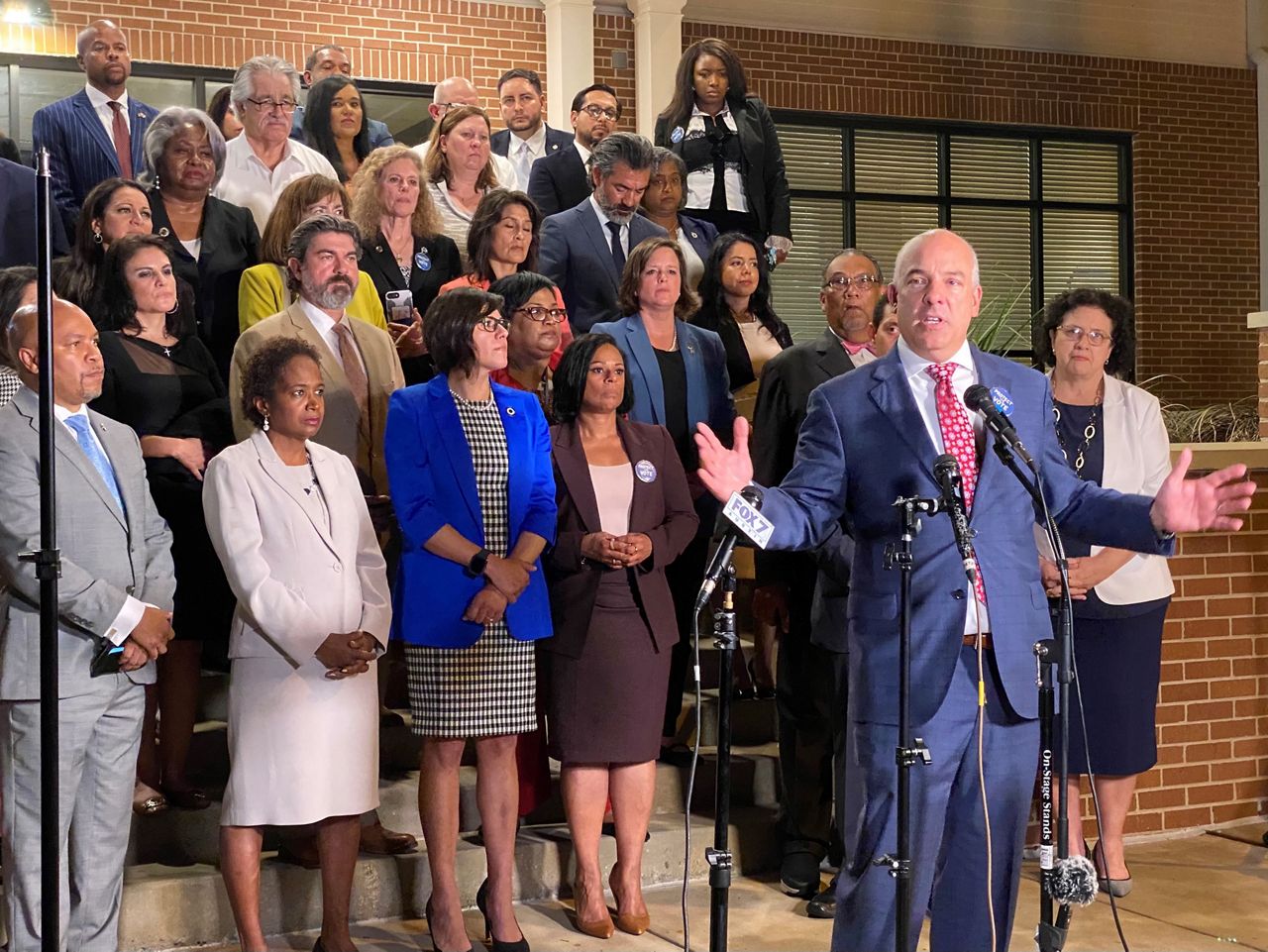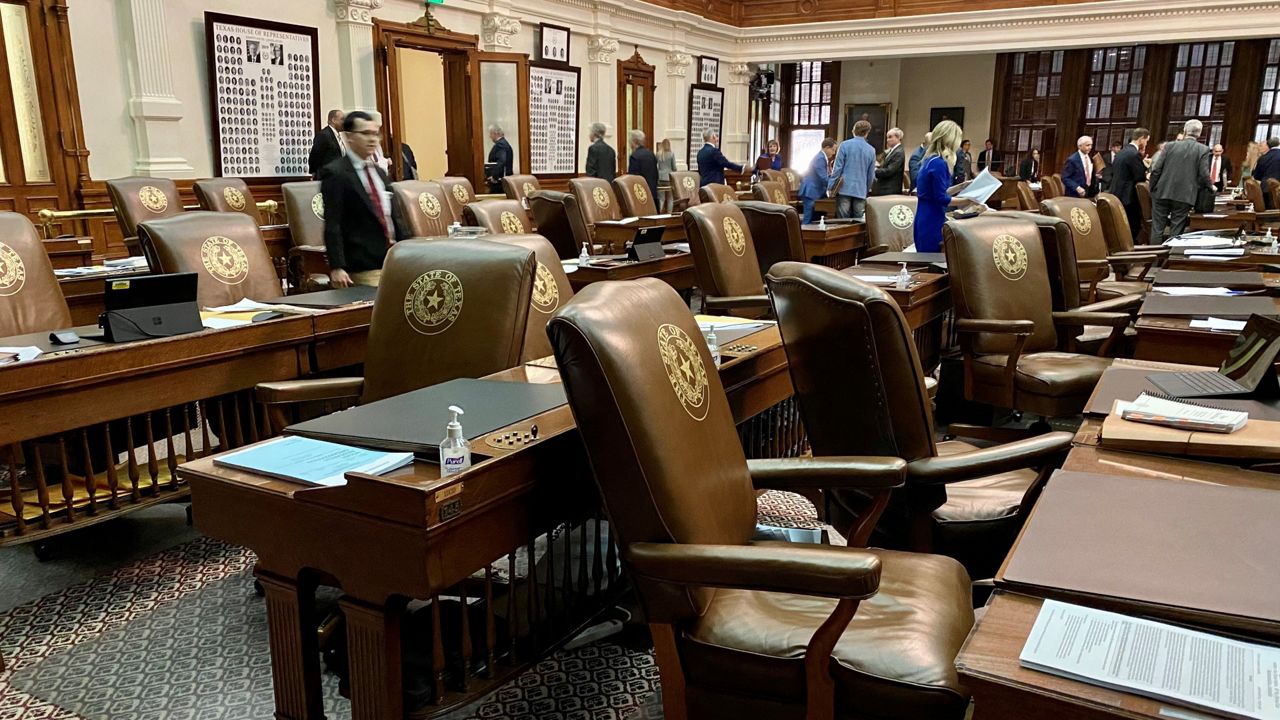AUSTIN, Texas — Democrats walked out of the Texas House on Sunday, blocking a vote on a controversial GOP-backed voting bill before a final deadline.
Senate Bill 7 is a sweeping measure that would create new limitations on early voting hours, make it easier to overturn an election, ban drive-through voting and add new vote-by-mail restrictions, to name a few.
The House faced a midnight deadline to approve the bill before it could head to Gov. Greg Abbott's desk to be signed into law. The Senate signed off on it overnight Sunday in a party-line vote. The regular legislative session ends Monday.
House Democrats began trickling off the floor during the debate Sunday night. Around 10:30 p.m., the remaining Democrats were seen walking out of the chamber. Without them present, the House did not have enough members for a quorum to vote, which requires two-thirds of the 150 members to be present.
Following their walkout, Democrats held a press conference at the Mt. Zion Baptist Church in East Austin to discuss their decision. They chose the location, in part, because of how the bill would set early voting hours on Sundays from 1 p.m. to 9 p.m. Democrats feared the provision would limit “Souls to the Polls” events in which many African American voters head to the polls after going to church.
“It is fitting that we are gathered here because the Black church has always been the focal point of the civil rights movement,” said Rep. Sheryl Cole, D-Austin. “It’s not just about ‘souls to the polls.’ It’s about the failure to recognize the elderly, the disabled, and peoples of color, and their constitutional right to vote.”
Democrats said they were prepared to speak at length about the proposed legislation, but took the extraordinary measure after realizing Republicans were limiting debate. Rep. Chris Turner, D-Dallas, said members had enough content to push discussion past midnight.
“We could’ve talked til noon tomorrow or midnight tomorrow on this bill but it was clear Republicans were going to short-circuit that process. They were going to shut off debate, stifle our voices and ram the bill through. When it became clear they were going to pull that nuclear grenade, if you will, our members left to deny them that opportunity,” Turner, chair of the House Democratic Caucus, said.

Late Sunday, Gov. Greg Abbott issued a statement saying he would add the items to a special session call.
"I declared election integrity and bail reform to be must-pass emergency items for this legislative session. It is deeply disappointing and concerning for Texans that neither will reach my desk," Abbott said. "They will be added to the special session agenda. Legislators will be expected to have worked out the details when they arrive at the Capitol for the special session."
Republicans have insisted there needs to be a zero-tolerance approach to voter fraud, even though there is no evidence of such widespread wrongdoing. GOP members also argue the Legislature needs to restore faith in the electoral system.
The final details of the major election bill were hashed out behind closed doors in a small GOP-majority group from both chambers. Republican conferees ended up adding a slew of new provisions that were not at some point a part of the version the House and Senate passed. Democrats argued those changes, such as one that would make it easier to overturn an election, needed more time to be vetted by the public.
“I don't expect them to like all of it. There are differences of opinion. I happen to think it's a very good bill. That it was some sort of shock or surprise or that something was dropped in, you know, some bombshell amendment, that's really, I think, a gross mischaracterization,” Rep. Travis Clardy, R-Nacogdoches, told Capital Tonight shortly after his Democratic colleagues left the chamber.
Clardy is a member of the House Elections Committee and was a part of the private negotiations. He said it was a bit of a surprise Democrats broke quorum, but he knew when it comes to contentious bills, there was always going to be a possibility.
“They postponed the inevitable. Passage of time may not work to their advantage,” Clardy said. “People expect us when we're elected to represent them to come and show up on the job and do the job. My district, they expect me to come fight for the best interest of my House district, knowing that I'm not always going to win.”
Lawmakers are expected to be back in the fall for a special session on redistricting after delayed census data due to the coronavirus pandemic. Gov. Abbott did not indicate if it would be added to that agenda or call an earlier special session over the summer.
In a statement, House Speaker Dade Phelan mentioned that because of the Democrats’ actions, other bipartisan bills were defeated and did not make the deadline.
“Today, on the second to last day of session, a number of members have chosen to disrupt the legislative process by abandoning the legislative chamber before our work was done. In doing so, these members killed a number of strong, consequential bills with broad bipartisan support including legislation to ban no-knock warrants, reform our bail system and invest in the mental health of Texans – items that their colleagues and countless advocates have worked hard to get to this point,” Phelan said. “Texans shouldn’t have to pay the consequences of these members’ actions -- or in this case, inaction -- especially at a time when a majority of Texans have exhibited clear and express support for making our elections stronger and more secure.”



